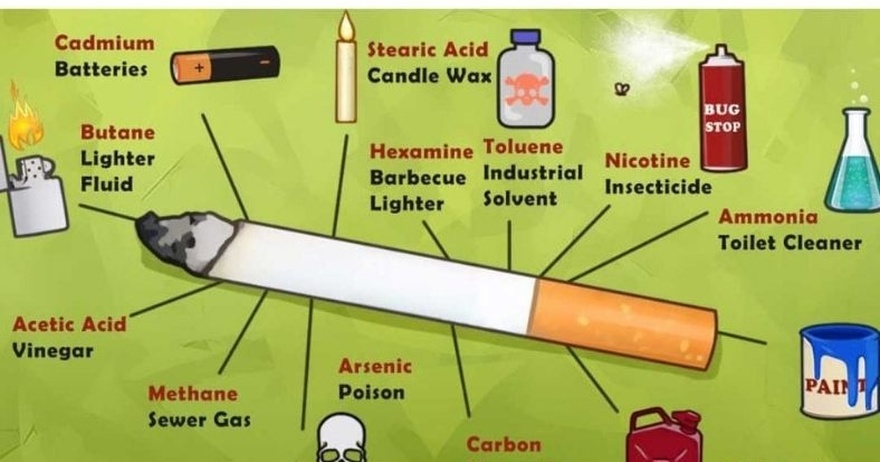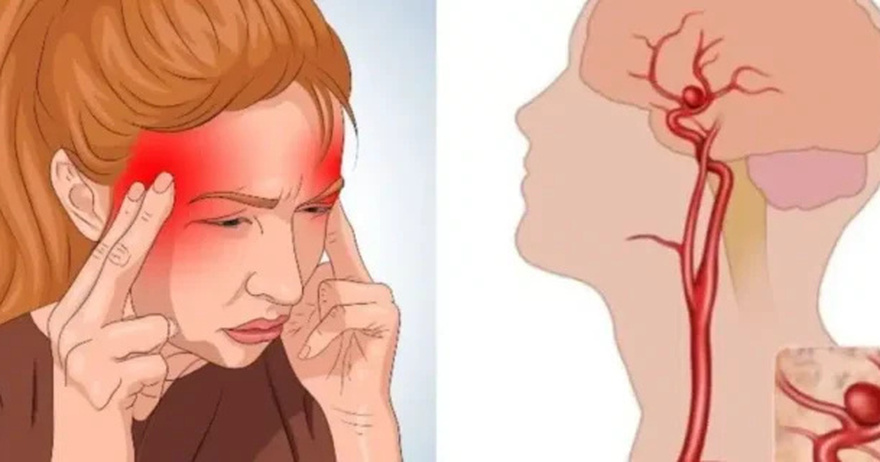When you think about smoking, you probably picture nicotine as the main ingredient. But did you know that every time you light up a cigarette, you’re inhaling a dangerous mix of toxic chemicals? Cigarettes contain far more than just nicotine, and the effects on your body are much worse than you might imagine. Let’s dive into the shocking truth about what’s really inside each cigarette and the impact it has on your health.
When you think about smoking, you probably picture nicotine as the main ingredient. But did you know that every time you light up a cigarette, you’re inhaling a dangerous mix of toxic chemicals?
When you smoke, you’re not just inhaling tobacco. Here are some of the dangerous substances you’re actually consuming:
Cadmium: The Battery Metal
Cadmium is a heavy metal used in batteries, and it’s one of the chemicals found in cigarette smoke. Over time, cadmium builds up in your kidneys, causing serious damage. Even worse, it’s a known carcinogen, meaning it can contribute to cancer.
Butane: Lighter Fluid in Every Puff
You’ve probably used a lighter before, but did you know that butane, the gas used in lighter fluid, is also present in cigarette smoke? Every puff exposes your lungs to this toxic chemical, which can cause severe respiratory issues.
Methane: The Sewer Gas
Believe it or not, methane, a gas commonly associated with sewage, is another chemical in cigarette smoke. While it might not be as harmful as other chemicals, the thought of inhaling sewer gas should be enough to make you reconsider smoking.
Arsenic: The Deadly Poison
Arsenic is a toxic substance used in pesticides, yet it’s also found in cigarettes. Long-term exposure to arsenic can lead to life-threatening diseases like cancer, heart disease, and diabetes.
Ammonia: Enhancing Nicotine Absorption
Ammonia is typically found in household cleaners, but in cigarettes, it’s used to enhance the absorption of nicotine. While it makes the nicotine hit stronger, it also irritates the lungs and worsens conditions like asthma.
Methanol: Rocket Fuel in Your Cigarettes
It’s hard to believe, but methanol, an ingredient used in rocket fuel, is part of cigarette smoke. Methanol exposure can lead to nerve damage and even death in severe cases, making it a serious health risk.
Hexamine: Barbecue Lighter Fluid
Hexamine is used in barbecue lighter fluid, and when you smoke, you’re inhaling it into your lungs. This chemical releases toxic fumes that can cause severe respiratory damage.
Stearic Acid: Candle Wax in Your Lungs
Stearic acid, a substance used in candles, is another chemical found in cigarettes. While it’s not as toxic as others, it still contributes to the overall damage caused by smoking.
Acetic Acid: The Ingredient in Vinegar
Acetic acid, the chemical responsible for vinegar’s sour taste, is also present in cigarette smoke. Breathing it in can irritate your respiratory system and add to the harmful effects of smoking.
Toluene: The Industrial Solvent
Toluene is commonly used in paint thinners and nail polish removers, but it’s also in cigarette smoke. Inhaling toluene can cause headaches, dizziness, and long-term neurological issues.
Nicotine: The Addictive Substance
Of course, we can’t forget nicotine, the highly addictive substance that keeps people smoking. Nicotine stimulates the release of dopamine, giving you a temporary feeling of pleasure. But this addictive cycle makes quitting much more challenging.
Carbon Monoxide: The Deadly Gas
Carbon monoxide, a toxic gas found in car exhaust, is also present in cigarette smoke. It reduces the oxygen in your blood, forcing your heart to work harder and increasing your risk of heart disease and other cardiovascular issues.
The Hidden Dangers of Secondhand and Thirdhand Smoke
Even if you’re not the one smoking, being around cigarette smoke puts you at risk. Secondhand smoke contains many of the same harmful chemicals, and exposure can lead to cancer, heart disease, and respiratory problems. But the dangers don’t stop there. Thirdhand smoke, the toxic residue left on surfaces after a cigarette is extinguished, can be particularly harmful to children, who may touch contaminated areas.
The Health Consequences of Smoking
It’s no secret that smoking is deadly. The chemicals in cigarettes damage nearly every organ in your body, leading to serious conditions like cancer, lung disease, and heart problems. Smoking not only shortens your lifespan but also significantly reduces your quality of life.
How to Quit Smoking and Protect Your Health
Quitting smoking is tough, but it’s not impossible. With the right approach, you can kick the habit and protect your health. Here are some options to help you quit:
Nicotine Replacement Therapy (NRT)
NRT provides a controlled dose of nicotine without the harmful chemicals found in cigarettes. Options like patches, gum, and lozenges can help ease cravings and make the transition to a smoke-free life smoother.
Prescription Medications
Prescription drugs like bupropion and varenicline can reduce nicotine cravings and withdrawal symptoms, making it easier to quit.
Support Groups and Counseling
Quitting is often easier with support. Counseling and support groups offer encouragement and practical advice, helping you stay on track. Surrounding yourself with others who are also quitting can be a great motivator.
Conclusion: Take Control of Your Health
Smoking isn’t just a bad habit—it’s a gateway to a host of toxic chemicals that put your health at serious risk. From cadmium to ammonia, the substances in cigarette smoke can damage your body in ways you may not realize. The good news? It’s never too late to quit. With the right resources and support, you can reclaim your health and enjoy a smoke-free future.
Το σπίτι της Κυρά Ρηνιώς στην Κίναρο είναι πλέον καινούργιο και η ίδια πολύ χαρούμενη – Βίντεο (👇𝝨𝝩𝝤 𝟏º 𝝨𝝬𝝤𝝠𝝞𝝤👇)
Μυστήρια Θάνατοι στα κρατητήρια του Α.Τ. Κω: Την επομένη, καθάρισαν και έβαψαν το κελί – «Έφαγε το ξuλo της χρονιάς»
Νέο κύμα κακοκαιρίας «σφυροκοπά» τη χώρα – Πότε έρχεται κατακόρυφη πτώση του υδραργύρου
Το νόημα του να φοράς βραχιολάκι στον αστράγαλο






























